
Wine strengthens Israeli-German ties
Twin Wineries project, which aims to promote inter-cultural dialogue between Israeli and German winemakers, celebrates fifth anniversary with special tasting of Teperberg 1870 wines in twin winery Staatlicher Hofkeller Würzburg
The sign marks the moving connection between the 885-year-old German winery and its Israeli twin.
A special tasting of Teperberg 1870 wines was held last week in the fancy wine cellars of the Hofkeller Winery as part of the Twin Wineries project, which is marking its fifth anniversary.
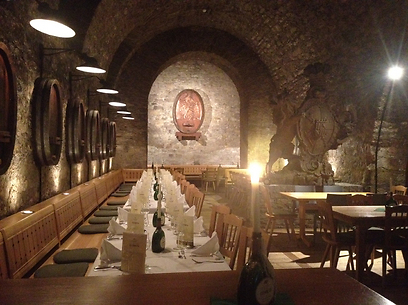
Hosting Teperberg 1870. Hofkeller
The Twin Wineries project is one of the most fascinating initiatives in the wine industry in Israel. It aims to promote inter-cultural dialogue between high-quality wineries in Germany and Israel, and more importantly – strengthen the ties between the two countries.
The project has created collaborations between wineries in the two countries, shared technical knowledge (in Hofkeller, for example, pipettes were introduced into the vineyards after a visit to Israel), encouraged export and import of wine and promoted wine in the origin country of each of the wineries.
The project was initiated by Baruch and Renée Salzman, the owners of Zag Wines, an exporter of Israeli wines to Germany which is responsible for exporting the products of wineries such as Tulip, Vitkin and others. Sixteen wineries have joined the project so far, eight from each country.
The Margalit Winery was matched to the Heymann-Löwenstein Winery in the Mosel region, the Vitkin Winery to the Georg Mosbacher Winery in Pfalz, the Golan Heights Winery teamed up with the Kloster Eberbach Winery, and Teperberg 1870 – with Hofkeller.
The Hofkeller Winery was founded in 1128 and specializes in white wines in general and in the Silvaner and Riesling grape varieties in particular. Its wines, which originate in the famous Stein vineyard on the banks of the Main River, graced the tables of European royal families and were famous in Germany and elsewhere, especially in the 18th and 19th centuries. During that period, German writer Johann Wolfgang von Goethe praised the winery's wines, which he considered his favorite.
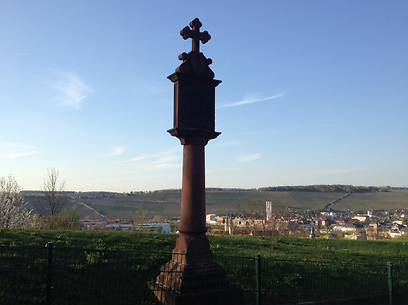
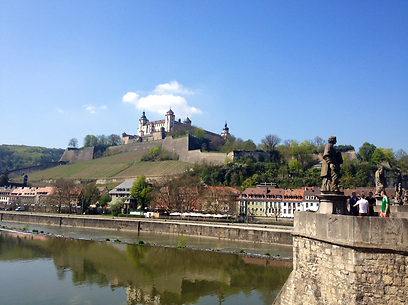
Capital of the historic district of Lower Franconia. Würzburg
Since the day it was founded, Hofkeller has been owned by the changing patrons of Würzburg, who sat in the fortress at the top of the hill overlooking the city.
The first owner was the duke of Franconia, who was replaced by the bishop on behalf of the Roman Empire, and today the winery is owned and run by the Bavarian government.
The winery's products are not available in Israel, but in Germany they are sold as elite wines, mostly thanks to their noble heritage.
Würzburg itself is one of the three main cities and capitals of the ancient Duchy of Franconia, a political entity which entered the books of history long ago and is divided today between several federal states in Germany.
Its German name, Franken, is still known as one of the country's most famous wine regions, thanks to the delicate white wines which originate in the grapes of the vineyards of its rivers. They are bottled in narrow-necked flask-shaped bottles, which resemble the Mateus bottle Israeli wine lovers remember from the 1980s and 1990s.
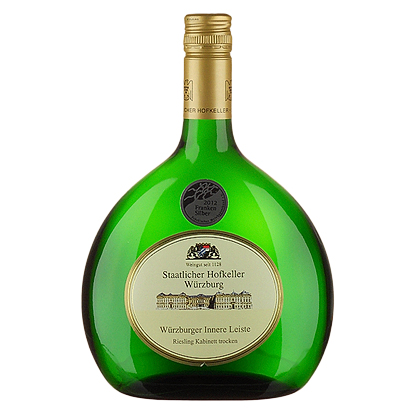
Resembles Mateus. Bottle of Franken white wine (Riesling in this case) of Hofkeller
Historic Franconia was also home to the Shum cities - an acronym for Speyer, Worms and Mainz – which were known as the most important Torah study centers in the golden era of the Ashkenazi Jewry in the Middle Ages, and were destroyed in pogroms in the 12th and 13th centuries.
The Jews of Würzburg, as in the rest of Germany's wine region, played a significant role in the trade and marketing of the local produce in the modern era, up to the Nazi party's rise to power and the Holocaust. Sixty percent of the general wine production in Germany before 1933 – the year Hitler came to power – was marketed and exported by Germany's Jews.
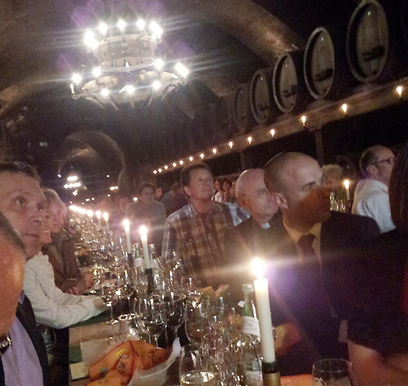
Teperberg's visit is the winery's return visit to Germany, after Hofkeller Managing Director Michael Jansen visited the winery in Kibbutz Tzora last year.
The festive wine tasting event was attended by Tibor Shalev Schlosser, Israel's consul-general in Munich and south Germany, as well as Barbara Stamm, the president of the Bavarian parliament, Würzburg Mayor Georg Rosenthal, the head of the Jewish community in Würzburg, the owner of the Teperberg 1870 winery, Moti Teperberg and his family members, as well as the winery's chief wine maker, Shiki Rauchberger.
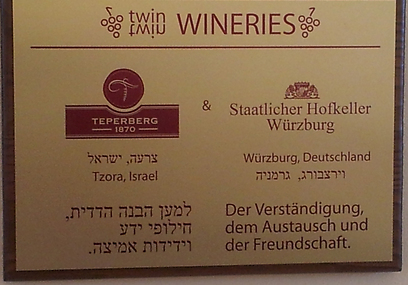
The tasting event included a lecture by Dr. Daniel Deckers, an editor in the politics section of the Frankfurter Allgemeine newspaper, on German Jews' part in the local wine industry before World War II.
The lecture was followed by a guided tasting of seven Teperberg 1870 wines, led by Rauchberger. The tasters expressed their enthusiasm over the winery's Malbec and Cabernet wines, which are unusual and almost exotic varieties for a cool area.
We, on the other hand, were particularly impressed by the winery's sparkling Riesling wine, which has been produced in the region for hundreds of years in the Méthode Champenoise – similar to the preparation of champagne in the Champagne region.
Similar wines originating in other regions in Germany are available in Israel – Dönnhoff from Nahe and Peter Jakob Kühn from Rheingau, both of which are imported to Israel by the Giaconda company.










